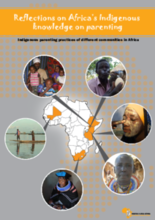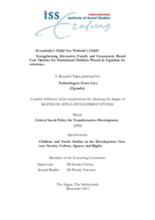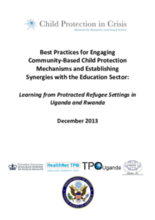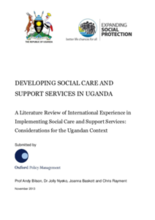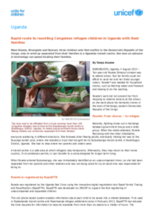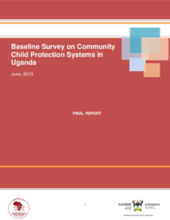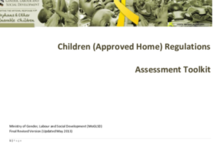This country page features an interactive, icon-based data dashboard providing a national-level overview of the status of children’s care and care reform efforts (a “Country Care Snapshot”), along with a list of resources and organizations in the country.
demographic_data
childrens_living_arrangement
children_living_without_bio
social_work_force
key_stakeholders
Key Stakeholders
Add New DataOther Relevant Reforms
Add New Datadrivers_of_institutionalisation
Drivers of Institutionaliziation
Add New Datakey_research_and_information
Key Data Sources
Add New DataThe Children Act (Uganda)
Country Care Review: Uganda
Prevalence and number of children living in institutional care: global, regional, and country estimates
The National Integrated Early Childhood Development Policy Action Plan (2016-2021) of Uganda
Catholic Care for Children in Uganda: A Family for Every Child - Findings from a Midterm Evaluation
Acknowledgements
Data for this country care snapshot was contributed by a consultant with the Data for Impact (D4I) Project at Palladium Group LLC.
Displaying 341 - 350 of 418
This publication, produced by the Parenting in Africa Network (PAN), highlights the skillful parenting practices of several pastoral communities in Africa.
The study examined alternative family and community care options and how they can be strengthened; cultural attitudes and perceptions of the communities and experiences of prospective foster and adoptive parents as regards reunification, kinship care, fostering and adoption.
The aim of this note is to outline some ways of engaging with community-based child protection mechanisms (CBCPMs), especially within the education sector, which apply in both urban and rural protracted refugee settings.
This is a statutory instrument detailing rules and regulations surrounding alternative care homes. This instrument defines what is necessary for the care and well-being of children within alternative care, and what they require medically and socially.
This paper provides a review of international and Ugandan literature on social care and support services particularly focussing on identifying key lessons that are relevant to the Ugandan context.
RapidFTR is a versatile open-source mobile phone application and data storage system that seeks to expedite the Family Tracing and Reunification (FTR) process by helping humanitarian workers collect, sort and share information about unaccompanied and separated children in emergency situations so they can be registered for care services and reunited with their families.
The present study explored the changes resulting from the Teenage Mothers Project (TMP) in Eastern Uganda, a program that empowers unmarried teenage mothers to cope with the consequences of early pregnancy and motherhood, as well as factors that either enabled or inhibited these changes.
This video describes the work of the Alternative Care Panel in Uganda, a panel composed of professionals who assess the stability of potential adoptive or foster parents to determine if the parents can provide for needy and vulnerable children, with the ultimate goal of keeping children out of institutional settings and in family-based care.
This report describes the process, findings and recommendations of the baseline survey for the project titled, “Building and Strengthening Community-Based Child Protection Systems in Busoga and Acholi sub-regions” commissioned by ANPPCAN. The baseline survey was intended to establish the status of project indicators so that the information obtained can inform the implementation of project activities.
This assessment toolkit and associated supporting documentation has been created to assist PSWO’s and Child Care Institutions to achieve compliance with the Children (Approved Home) Regulation 2010.

